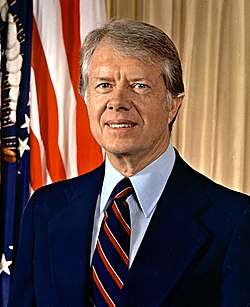
Back Jimmy Carter ACE Jimmy Carter Afrikaans Jimmy Carter ALS ጂሚ ካርተር Amharic Jimmy Carter AN Iacobus Carter ANG جيمي كارتر Arabic دجيمي كارتر ARY جيمى كارتر ARZ জিমি কাৰ্টাৰ Assamese
Jimmy Carter | |
|---|---|
 Official portrait, 1977 | |
| 39th President of the United States | |
| In office January 20, 1977 – January 20, 1981 | |
| Vice President | Walter Mondale |
| Preceded by | Gerald Ford |
| Succeeded by | Ronald Reagan |
| 76th Governor of Georgia | |
| In office January 12, 1971 – January 14, 1975 | |
| Lieutenant | Lester Maddox |
| Preceded by | Lester Maddox |
| Succeeded by | George Busbee |
| Member of the Georgia State Senate from the 14th district | |
| In office January 14, 1963 – January 9, 1967 | |
| Preceded by | James M. Dykes |
| Succeeded by | Hugh Carter |
| Personal details | |
| Born | James Earl Carter Jr. October 1, 1924 Plains, Georgia, U.S. |
| Died | December 29, 2024 (aged 100) Plains, Georgia, U.S. |
| Resting place | Jimmy Carter House, Plains |
| Political party | Democratic |
| Spouse | |
| Children | 4, including Jack and Amy |
| Parents | |
| Relatives | Carter family |
| Education | United States Naval Academy (BS) |
| Occupation |
|
| Civilian awards | Full list |
| Signature |  |
| Military service | |
| Branch/service | United States Navy |
| Years of service |
|
| Rank | Lieutenant |
| Battles/wars | World War II |
| Military awards | |
James Earl Carter Jr. (October 1, 1924 – December 29, 2024) was an American politician and humanitarian who was the 39th president of the United States from 1977 to 1981. A member of the Democratic Party, Carter served from 1971 to 1975 as the 76th governor of Georgia and from 1963 to 1967 in the Georgia State Senate. He was the longest-lived president in U.S. history and the first to reach the age of 100.
Born in Plains, Georgia, Carter graduated from the U.S. Naval Academy in 1946 and joined the submarine service before returning to his family's peanut farm. He was active in the civil rights movement, then served as state senator and governor before running for president in 1976. He secured the Democratic nomination as a dark horse little known outside his home state before narrowly defeating Republican incumbent Gerald Ford in the general election.
As president, Carter pardoned all Vietnam draft evaders and negotiated major foreign policy agreements, including the Camp David Accords, the Panama Canal Treaties, and the second round of Strategic Arms Limitation Talks, and he established diplomatic relations with China. He created a national energy policy that included conservation, price control, and new technology. He signed bills that created the Departments of Energy and Education. The later years of his presidency were marked by several foreign policy crises, including the Soviet invasion of Afghanistan (leading to the end of détente and the 1980 Olympics boycott) and the fallout of the Iranian revolution (including the Iran hostage crisis and 1979 oil crisis). Carter sought reelection in 1980, defeating a primary challenge by Senator Ted Kennedy, but lost the election to Republican nominee Ronald Reagan.
Polls of historians and political scientists have ranked Carter's presidency below average. His post-presidency—the longest in U.S. history—is viewed more favorably. After Carter's presidential term ended, he established the Carter Center to promote human rights, earning him the 2002 Nobel Peace Prize. He traveled extensively to conduct peace negotiations, monitor elections, and end neglected tropical diseases, becoming a major contributor to the eradication of dracunculiasis. Carter was a key figure in the nonprofit housing organization Habitat for Humanity. He also wrote political memoirs and other books, commentary on the Israeli–Palestinian conflict, and poetry.
© MMXXIII Rich X Search. We shall prevail. All rights reserved. Rich X Search